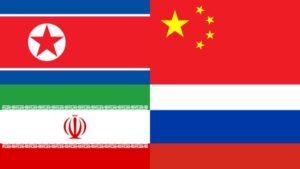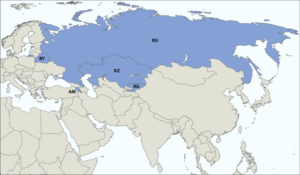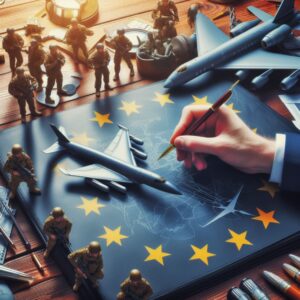The idea of a common European army covering the entire continent had already been talked about since the end of World War II. Despite the establishment of NATO (North Atlantic Treaty Organization – military alliance between the US, Canada, and several European countries) in 1949, Europeans already knew deep down that they could not fully rely on the future goodwill of the de facto world policeman, the United States.
This lack of complete trust in the largest military partner, led to the proposals to create the European Defense Community in 1950 and the Western European Union in 1954.
Both failed to capitalize on the concept of a “common security force,” where there is a mutual defense pact between different countries. But even so, the idea of a common European defense system remains to this day.

It has even gained great momentum lately, especially in the era of “Trump policies” that focused on increasing American isolationism. Even Donald Trump has proclaimed on more than one occasion that he “doesn’t care” about Europeans.
As a result, one of the European Union’s informal leaders, German Chancellor Angela Merkel, has long pushed for greater defense integration in the EU, putting the current defense system of several European countries that are based on alliance with the Americans via NATO, in an “uncomfortable situation.”
What steps have the Europeans taken to integrate their armed forces?
Since Trump took office, the Europeanization of continental security has so far occurred through two institutions. The establishment of the Permanent Security Cooperation (PESCO) in 2018 and the expansion of the European Border and Coast Guard Agency (FRONTEX) in 2016.
PESCO has so far focused on cooperation in areas of non-conflict for member states, such as procurement, investment, or voluntary defense projects, which several countries choose not to participate in.
However, Frontex has in the past year achieved a truly groundbreaking success in reforming European security. Largely overshadowed by the negative news about Covid-19, starting in May 2020, Frontex began hiring members of the first EU-wide “law enforcement corps” (border police) under the jurisdiction of the European Union itself as a whole, rather than a single member state.
The growth of Frontex…
Frontex’s new permanent membership currently numbers about 700 police specialists and is expected to grow to 3,000 uniformed officers by 2027.
Frontex also plans to increase the number of national deployments (short-term exchanges of national border guards across the EU) to 7,000 in the same year.
Frontex officers are to perform the same functions as regular border guards, such as border control, search and rescue activities, detection of fraudulent documents or prevention of cross-border crime.
However, the change from the national detachment model (made up of policies from member states) to a permanent police corps will allow for a more effective fight against transnational threats to the security of the Union as a whole.
In addition to innovative personnel changes, Frontex is also revolutionizing in its procurement of equipment. Until now, Frontex officers on duty have participated in the agency’s operations in their national uniforms, with a distinctive light blue Frontex armband. For the new corps, this is changing, as Frontex has announced the creation of the “EU police” uniform.”
Along with the uniforms, there are big plans to acquire their own equipment ranging from planes, guns, drones, to ships. All will be owned exclusively by the agency itself, not a member state. This indicates a further shift in the policy of national deployments in terms of personnel and resources.
Frontex reinforcing the image of a common European security identity
The importance of having a standardized uniform lies in its effect on European identity. While on the other hand, the different uniforms of the national border guard promoted the willingness of states to help each other.
The common uniform will have a broad psychological effect by portraying the EU as a unitary entity to the outside world. This common “uniform” will also promote a sense of belonging and a common cause within the Union, something similar to what the Erasmus European student exchange program has done.
However, this may create some friction between the more pro-integration Western European bloc and the more Euroskeptic Central and Eastern bloc of countries (against further integration at the European level). For France or Germany, EU integration is slow and not comprehensive enough. As for the informal Visegrad group (V4), consisting of Hungary, Poland, Slovakia and the Czech Republic, European integration sometimes goes too far.
The establishment of the uniformed semi-military corps is therefore a surprising compromise on the part of these countries. It transfers a certain amount of power and competencies from the member states to the Union, something that the V4 generally opposes.
However, the Visegrad group has called for increasing the powers of Frontex to address what is an issue of even greater national concern than EU integration, uncontrolled immigration from outside the bloc.
Can Frontex be an example of integration for other security sectors?
The permanent Frontex corps can therefore be considered a logical and easy answer to more urgent security challenges that will come in the future of the bloc. After all, a secure external border is in the interest of all members. Especially in 2015 when borders in southern European countries were collapsing with illegal immigration.
Could this mean that more integrated security initiatives for the EU are coming? Does it mean that member states will be willing to sacrifice other parts of their sovereignty for the benefit of the transnational union? Or will this greater defense union just fan the nationalist fires that are already burning across the continent and blame the Eurocrats (bureaucrats who work in the European Union) in Brussels for everything bad that happens in their countries?
The establishment of an independent uniform service sets a powerful precedent for future projects and gives Europeans something they can identify with. The success of this initiative is crucial if the EU is to go down the road of closer integration in the area of security and one day form a European army.
Failure, on the other hand, may lead member states to oppose further integration in other areas such as taxation for example.
New challenges in the areas of security for the European Union
With conflicts growing in the EU neighborhood in recent years, a European army has become an even more relevant issue in political and military circles. The EU is entering uncertain times with the UK (and a nuclear power) leaving the bloc.
Most of the EU’s neighborhood has also become more unstable (Crimea, Belarus, Caucasus, Balkans…), with “frozen conflicts” that may reheat, in addition to the uncertainties of US foreign policy.
Even the normally Euroskeptic Central European states may realize that no one else but the European community can provide lasting security guarantees for the continent.
However, for the EU army to become a reality, the states must first undergo more comprehensive integration in many other fields, from economic or legal integration to the standardization of military equipment.
For the foreseeable future, we will probably see mainly small or medium-scale military projects, such as that of the permanent Frontex corps.
The European Union has been seeking to increase its “strategic autonomy.” In other words, not to become dependent on other countries and regions in areas that may be related to the bloc’s security such as access to medical equipment. Focusing on the autonomy of its security would also be natural.
Whether with or without NATO, apart from the European community, no one is able to provide lasting security guarantees for the continent. Moreover, this will also increase the bloc’s military projection power, being able to intervene militarily around the planet when they need to and thus taking an even bigger step towards a global Europe and thus growing as a third world potential together with the US and China.
In general, a multipolar world can be better than a bipolar world of extreme rivalry.






日軍第731部隊旧址_PB121201-e1713902593308-300x224.jpg)








[…] what can be observed is a concise military strengthening strategy, with the possible formation of a the European Union’s own joint army in the near future. To achieve this, there are the conflicts between Poland and Russia, where there […]